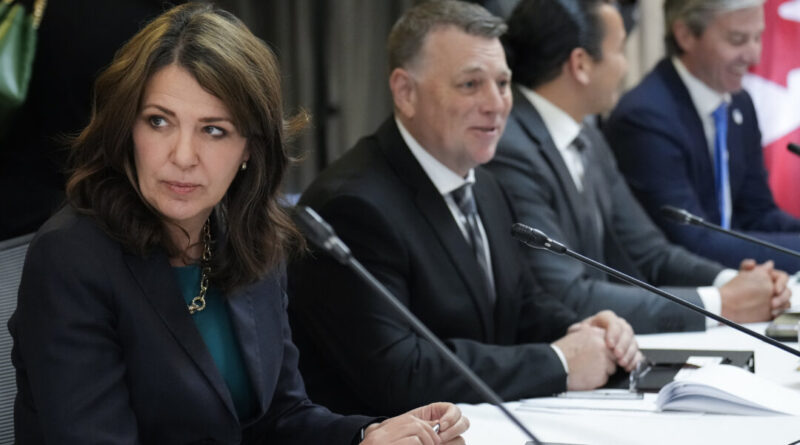Alberta Premier Smith Calls for Diplomacy to Ease Tensions Amid Tariffs
Alberta Premier Danielle Smith is urging Ottawa and her fellow premiers to use diplomacy as the “primary tool” to resolve U.S. tariffs on Canadian goods.
A trade war has erupted between Canada and the United States since U.S. President Donald Trump imposed tariffs on Canadian goods over the weekend. Trump’s tariffs went into effect on Feb. 1 with a 10 percent tax on oil and gas exports from Canada and a 25 percent tax levied on all other imported goods.
Smith says the lower tax on Canada’s energy export to the United States came as a result of the “sustained diplomatic efforts and advocacy” of her government since Trump first floated the idea of tariffs against Canada after his November 2024 election.
“As premier of Alberta, I am calling on my fellow premiers, the prime minister and all of our national leaders to de-escalate the rhetoric as much as possible and look to diplomacy and advocacy as our primary tool to resolve this conflict.”
While Canadian oil, gas, critical minerals, electricity, and uranium are subject to a 10 percent tariff, other products from Canada like lumber or food are subject to the 25 percent tariff.
Canada has retaliated with 25 percent tariffs on $155 billion worth of American imports, targeting products like alcohol, food, household appliances and furniture, clothing, and cosmetics.
These measures will be enforced until the United States rescinds its tariffs on Canadian goods, the department of finance has said.
Smith for weeks has been advocating for a more moderate response to Trump’s tariffs, maintaining that a deal could be made to benefit both countries.
“Although I understand the need for this proportionate response, make no mistake, a tariff war with the United States will hurt millions of Canadian families, workers and businesses,” Smith wrote.
Trump and Mexican President Claudia Sheinbaum announced on Feb. 3 they reached a deal to defer 25 percent U.S. tariffs on Mexican products that were set to take effect the next day.
Mexico and the United States negotiated a series of agreements, under which Mexico will promptly deploy 10,000 National Guard officers to the border to target fentanyl trafficking, Sheinbaum said in a social media post.
Smith is planning two more trips to Washington, D.C., this month to participate in the Republican Governors Convention and to meet with elected and administration officials to discuss solutions to the tariffs. She previously travelled to Florida to meet with Trump at his Mar-a-Lago resort, and also travelled to Washington for his inauguration to meet with his officials.
“I will never stop telling Alberta’s and Canada’s story to our friends and allies south of the border. I encourage all elected Canadian leaders to do the same,” she wrote. “The Canadian-U.S. friendship with the American people is far more important and enduring than any one person. We would do well to remember that.”
Border Security and NATO Spending
The security of the border Canada shares with the United States continues to be an issue and a primary reason for the tariffs, Smith said.
Trump has accused both Canada and Mexico of failing to address the problems of illegal immigration and drug smuggling through their borders into the United States.
Canada has responded with a $1.3 billion plan to increase border security, which includes deploying helicopters and drones and other measures at the border.
Some provinces have introduced strategies to strengthen security at their southern borders, such as using provincial police forces to patrol the border.
The border czar would “coordinate the securing of our border against illegal migrants and drugs moving in both directions,” she said in her op-ed article.
She is also calling on Ottawa to meet its NATO commitment to spend 2 percent of the country’s gross domestic product (GDP) on defence by 2027.
“These things should be done for the safety of all Canadians regardless of our trade dispute with the United States,” she said.
All NATO allies, including Canada, renewed their pledge in 2023 to spend at least 2 percent of their country’s GDP on defence. Canada currently spends just shy of 1.4 percent of its GDP on the military.
Defence Minister Bill Blair said on Jan. 24 that Canada could meet the 2 percent target sooner than planned, saying it was “achievable” to meet the target in two years, though he did not commit to a firm deadline.
In announcing Canada’s retaliatory tariffs on Feb. 1, Trudeau talked about the close bond between the two nations, and said the tariffs will increase costs for people on both sides of the border, but added, “We will stand strong for Canada.” Trudeau also said that Canada has taken action to secure the border, and that drugs and illegal migrant crossings at the Canadian border are small.
Finance Minister Dominic LeBlanc similarly said on Feb. 2 that “Canada will not stand by as the United States imposes unjustified and unreasonable tariffs on Canadian goods.”
A number of premiers have announced their own retaliatory measures, including pulling American alcoholic beverages from store shelves and limiting the access of American firms from provincial government projects. In the case of British Columbia, Premier David Eby has directed the BC Liquor Distribution Branch to stop buying liquor from Republican states.
Energy Policies
Smith’s op-ed also criticized the federal government’s “parade of anti-energy policies,” saying it has made Canada less competitive and more vulnerable.
Smith cited the obstruction of the B.C. Northern Gateway pipelines, regulations that resulted in the cancellation of the Energy East pipeline, and indecision regarding the approval of liquefied natural gas terminals and pipelines as examples of the Liberal government’s failure to broaden the country’s prospects.
Investment “uncertainty” created by Ottawa has rendered Canada nearly wholly dependent on U.S. consumers for the purchase of its largest export: oil, Smith said, adding that Canada is vulnerable to the current trade dispute as a result.
Smith has appealed to the federal government and all provincial leaders to unite in a national effort to accelerate the development and construction of various oil and gas pipelines to Canada’s east, west, and north coasts.
“Absurdly high” taxes, red tape, and interprovincial trade barriers also need to be addressed, she said.





